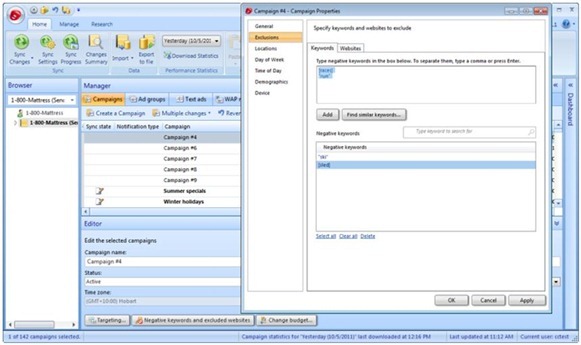AdCenter Releases Support For Negative Exact Match Today
Microsoft adCenter today is releasing Negative Exact Match as part of the series of upgrades and improvements adCenter is delivering for its customers this Fall. The change comes at an opportune time — right before the holiday season begins. AdCenter’s negative-keyword handling has been near the top of the list of core differences between AdWords […]
Microsoft adCenter today is releasing Negative Exact Match as part of the series of upgrades and improvements adCenter is delivering for its customers this Fall. The change comes at an opportune time — right before the holiday season begins. AdCenter’s negative-keyword handling has been near the top of the list of core differences between AdWords and adCenter for many advertisers. This update should help close the gap on this feature considerably.
Support for the new features will be available on the web interface immediately. Support for the Desktop Editor and API will follow shortly.
Along with this update, keyword-level negatives will be going away. The impact of this should be minimal, as most advertisers avoid using them. The non-cumulative nature of adCenter’s negatives — adding a keyword-level negative would then ignore any Campaign or AdGroup negatives — along with the character limit (10,000 characters) have been practical barriers to managing keyword-level negatives for most advertisers.
This update will not include negative broad match. Advertisers can still use phrase and now exact match to filter out the queries that don’t match their keywords well.
AdGroup negatives will continue to fully replace Campaign negatives (as opposed to being cumulative, as with AdWords). This platform choice requires extra management effort from advertisers, and the recent bulk-edit improvements to the Editor are no doubt intended to address this issue directly. AdCenter is reportedly considering moving to a system more like AdWords. Either approach can be effective, but they do have different requirements for easing the manageability. (See below for some online discussion forums where you can voice your opinions and wishes.)
Microsoft says the adCenter team is doing their best to implement the features advertisers want the most – and, in this advertiser’s opinion, the introduction of negative exact match is strong evidence of that this is the case.
Timing
An adCenter representative confirmed this update will be releasing today, November 17, 2011. I was also told it has been in beta with select advertisers (who probably can’t talk about it because of NDA obligations).
How this will impact Advertisers
We will be able to refine the targeting of our AdGroups (and possibly reorganize them according to our needs). I’ll explain with an example. I like to run “Airtight” AdGroups, like the following:
- Terrain(Mountain) Type(Bike)
- Terrain(Mountain) Type(Bike) Accessory(Tires)
You might imagine that in this example, we want searches for “mountain bike tires” to go to the 2nd AdGroup, but not the 1st. We can do that today; We just add “tires” as a negative-phrase match to the 1st AdGroup. However, this does not prevent broad matches in the 2nd AdGroup from picking up stray searches for “mountain bikes” (i.e.: without the “tire”). When this feature goes live, we will be able to prevent these leaks. We can simply add a negative-exact match for “mountain bike” into the 2nd AdGroup, and voila!
Pro-Tip:
You can crack open a Search Query Report today and find out if you are picking up unwanted (or poorly-targeted) traffic. I hope to release an article about our Search Query Report PPC Shop Tool soon. Here is a Screen Shot:
Online Discussion
Mention of the feature “leaked” into adCenter Help. (Expand the “Add negative keywords to ad groups” section.)
The feature is officially “planned” according to the adCenter feature-suggestion site.
Here is a verified post from MSFT on the adCenter forums.
Do you have some favorite wants and wishes? You can voice your own most-wanted features on the adCenter feature-suggestion site.
Contributing authors are invited to create content for Search Engine Land and are chosen for their expertise and contribution to the search community. Our contributors work under the oversight of the editorial staff and contributions are checked for quality and relevance to our readers. The opinions they express are their own.
Related stories
New on Search Engine Land

